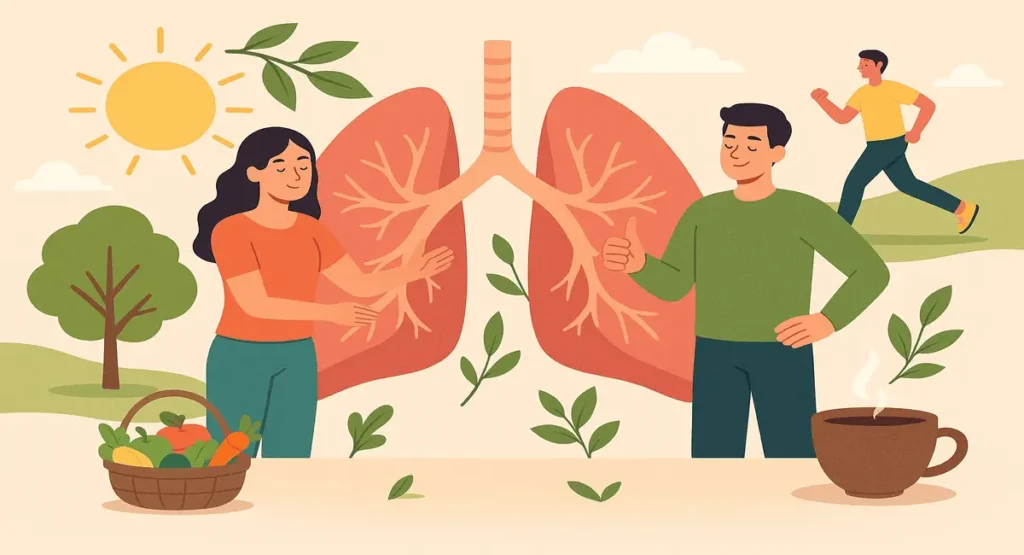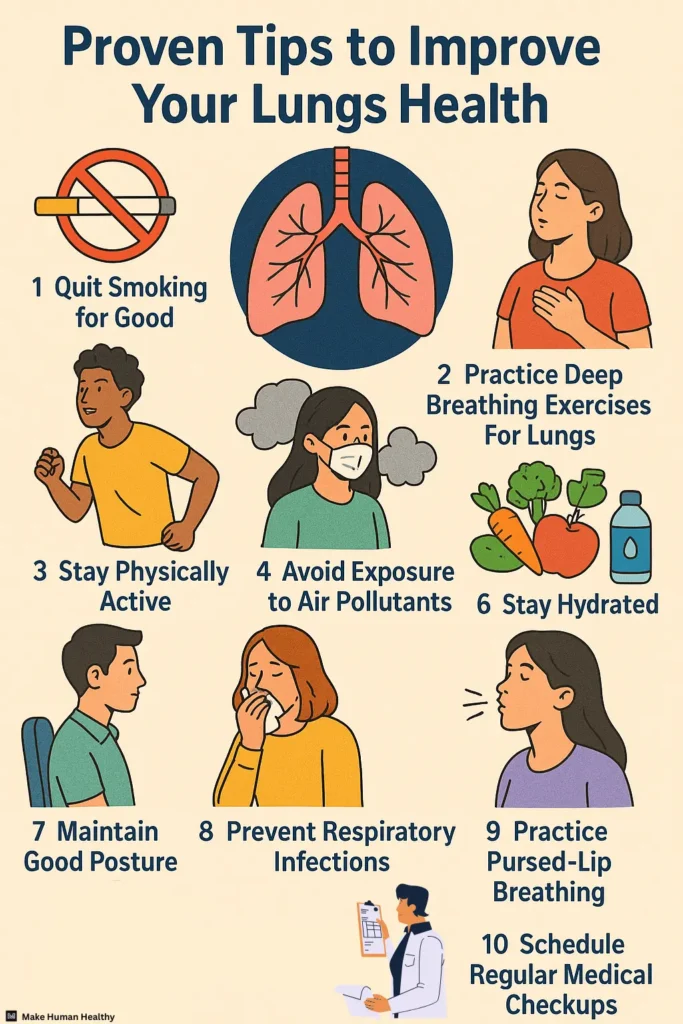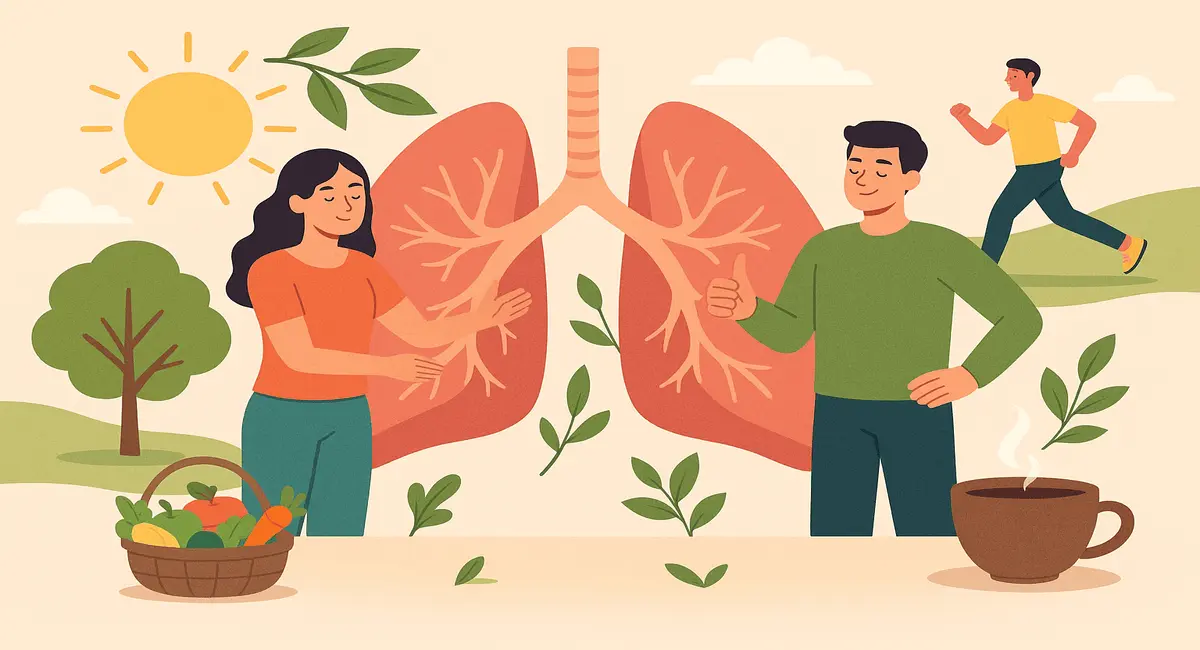Your lungs are essential for every breath you take, supplying your body with the oxygen it needs to thrive. In medical terms, the lungs are part of the respiratory system, and maintaining their health is key to overall pulmonary function. People often don’t think about their lung health until they start having breathing problems. Poor air quality, smoking, sedentary habits, and even everyday stress can gradually impact your breathing and overall well-being.
The good news? You can take simple, science-backed steps to improve your lungs health and boost your respiratory performance. Whether you’re looking to breathe easier, increase energy, or prevent lung-related illnesses, this guide offers practical advice on how to keep your lungs healthy for the long run.
Let’s explore easy, effective habits to support stronger lungs and a healthier life.
Table of Contents
Why Lungs Health Matters ?
Lung health is essential for maintaining your body’s energy and vitality. Healthy lungs help deliver oxygen efficiently to your bloodstream, allowing your organs and tissues to function at their best. When your lungs are strong, you breathe easier, feel more active, and support your immune system naturally.
On the other hand, poor lung function can lead to serious conditions such as asthma, bronchitis, chronic obstructive pulmonary disease (COPD), and even lung cancer. In today’s world—where air pollution, smoking, and sedentary habits are widespread—it’s more important than ever to improve lung capacity through conscious lifestyle choices.

Understanding the benefits of healthy lungs goes beyond just better breathing; it’s about enhancing your overall well-being, boosting your endurance, and reducing the risk of long-term respiratory problems. By taking care of your lungs today, you invest in a healthier and more active future.
Proven Tips to Improve Your Lungs Health
Looking after your lungs can be simple and straightforward. With the right habits and lifestyle choices, you can significantly improve lung capacity and support long-term respiratory wellness.
These science-backed strategies are simple, effective, and suitable for people of all ages. Whether you’re looking to breathe easier, prevent disease, or just understand the best ways to keep your lungs strong, the tips below will guide you on the path to better lung function and overall well-being.
1. Quit Smoking for Good
Smoking is a major contributor to lung damage. The harmful chemicals in cigarettes cause inflammation, destroy lung tissue, and significantly increase the risk of lung diseases, including lung cancer and COPD. If you’re a smoker, quitting is the single most impactful step you can take to improve lung capacity and overall well-being.
Tips to Quit Smoking:
- Seek support from friends, family, or professional counselors.
- Join smoking cessation programs or support groups.
- Consider using nicotine replacement options such as patches, gum, or lozenges.
- Consider prescription medications that can help reduce nicotine cravings.
- Utilize mobile apps designed to help track progress and provide motivation.
Bonus Tips: If you’re tired of struggling with willpower and want a proven method to quit smoking for good, check out Allen Carr’s Easy Way to Quit Smoking Without Willpower. This updated guide has helped millions break free from nicotine addiction—without relying on willpower or substitutes. [Learn more here].
2. Practice Deep Breathing Exercises For Lungs
Deep breathing is one of the most effective and natural ways to improve your lungs health. By practicing controlled breathing techniques daily, you can strengthen your respiratory muscles, increase lung capacity, and enhance the flow of oxygen throughout your body.
These exercises not only support better lung function but also help lower stress levels and improve mental clarity. Whether you’re sitting quietly or incorporating breathing into yoga or meditation, this simple habit can have a powerful impact on your overall lung and emotional health.
How to Practice Deep Breathing:
- Choose a calm environment and sit in a relaxed position.
- Breathe in deeply through your nose, letting your diaphragm expand completely.
- Hold your breath for 3-5 seconds.
- Exhale slowly through your mouth, ensuring you empty your lungs completely.
- Repeat this process for 5-10 minutes daily.
Benefits of Deep Breathing:
- Increases lung capacity over time.
- Reduces stress and anxiety.
- Promotes better oxygen circulation in the body.
Bonus Tips: If you’re looking to improve your breathing techniques and build lung strength, the Inhale Respiratory Trainer is a fantastic tool. This compact, portable device comes with adjustable resistance and is easy to clean, making it perfect for daily use. Check it out here and start enhancing your mindful breathing practice today!
3. Stay Physically Active
Regular physical activity plays a key role in helping you improve your lungs health. When you work out, you start breathing faster, which helps your lungs send more oxygen into your blood and get rid of carbon dioxide more effectively.
Activities like walking, cycling, swimming, or jogging act as natural lung strengthening exercises, improving lung capacity and endurance over time. Exercise also strengthen your respiratory muscles and supports overall cardiovascular health. Even light daily movement can make a significant difference in keeping your lungs active and resilient.
Best Exercises for Lung Health:
- Cardiovascular Workouts: Activities like jogging, swimming, or cycling are excellent for improving lung efficiency.
- Strength Training: Lifting weights and resistance exercises support overall fitness and respiratory function.
- Yoga: Incorporating yoga helps improve lung capacity through controlled breathing techniques (pranayama) and posture correction.
4. Avoid Exposure to Air Pollutants
Protecting yourself from air pollution is essential if you want to improve your lungs health and breathe easier every day. Polluted air—whether from traffic, industrial emissions, cigarette smoke, or indoor toxins—can damage lung tissue, reduce lung function, and trigger or worsen conditions like asthma and bronchitis.
To reduce lung irritation, limit outdoor activities on days with poor air quality, avoid secondhand smoke, and keep your indoor spaces well-ventilated and clean. Using air purifiers, houseplants, and non-toxic cleaning products can also help create a lung-friendly environment.
Ways to Reduce Exposure to Pollutants:
- Use high-quality air purifiers in your home and workspace.
- Keep windows closed during high pollution days or when pollen counts are high.
- Avoid exercising outdoors in areas with heavy traffic or poor air quality.
- Wear a mask in dusty or polluted environments.
- Ventilate your home regularly to prevent indoor pollutants from accumulating.
Bonus Tip: Struggling with allergies, pet hair, or odors in your home? The LEVOIT Air Purifier is designed to tackle these issues head-on, covering spaces up to 1095 ft². Breathe easier and create a cleaner, healthier environment. [Check it out here].
We always recommend our usres to contact healthcare professional before taking any medicines or supplements.
5. Eat a Healthy Diet For Lungs
The food you eat can directly affect how well your lungs function.A balanced, nutrient-rich diet is a powerful way to improve lung capacity and support long-term respiratory wellness.
Including plenty of foods for healthy lungs—such as leafy greens, berries, turmeric, ginger, fatty fish, and citrus fruits—can help reduce inflammation, fight oxidative stress, and strengthen your immune system.
These foods are packed with antioxidants, vitamin C, vitamin E, and omega-3 fats—all of which help protect your lungs and support better breathing.

Foods for Better Lung Health:
- Garlic and Ginger: Both have natural anti-inflammatory properties.
- Leafy Greens: Spinach, kale, and broccoli are packed with nutrients that fight inflammation.
- Berries: Blueberries, strawberries, and raspberries are packed with antioxidants that help protect your lung tissue.
- Citrus Fruits: Oranges, lemons, and grapefruits provide vitamin C, which supports immune health.
- Omega-3 Fatty Acids: Found in fatty fish like salmon, flaxseeds, and walnuts, these help reduce inflammation.
6. Stay Hydrated
Drinking enough water each day is a simple yet powerful way to improve your lungs health. Staying well-hydrated keeps the mucus in your lungs and airways thin, which helps your body remove irritants more easily and reduces the chance of congestion.
Understanding the importance of hydration for lungs is crucial—when you’re dehydrated, mucus can become thick and sticky, leading to breathing difficulties and increased risk of infections. Aim to drink at least 6–8 glasses of water daily to support optimal lung function and keep your respiratory system running smoothly.
How to Stay Hydrated:
- Drink at least 8-10 glasses of water daily.
- Drink more water when you’re working out or in hot weather.
- Add hydrating foods like cucumbers, watermelons, and oranges to your meals.
7. Maintain Good Posture
Your posture plays a surprisingly important role in how well your lungs function. Sitting or standing upright allows your lungs to expand fully, which helps you take in more oxygen with each breath. On the other hand, slouching compresses your chest and limits lung capacity, making it harder to breathe deeply.
By practicing good posture for better breathing, you can naturally improve your lungs health and enhance your overall respiratory efficiency. Simple habits like sitting tall, keeping your shoulders relaxed, and aligning your spine can make a noticeable difference in your breathing and energy levels.
Posture Tips for Better Breathing:
- Keep your back straight and shoulders relaxed whether you’re sitting or standing.
- Avoid hunching over desks or mobile devices for long periods.
- Use ergonomic furniture to support proper alignment.
Bonus Tips: Good posture isn’t just about looking confident—it’s about feeling great too. The Fit Geno Back Brace Posture Corrector helps straighten your shoulders and align your spine, so you can stand tall and pain-free. [Start improving your posture today].
8. Prevent Respiratory Infections
Respiratory infections—such as the common cold, flu, or pneumonia—can seriously impact your breathing and weaken your lungs over time. These illnesses may cause inflammation, mucus buildup, and long-term damage if not properly managed.
To improve lung capacity and protect your lungs from infection, it’s important to take preventive steps. Practice good hygiene by washing your hands regularly, avoid close contact with sick individuals, stay up to date on vaccinations (like the flu and pneumonia shots), and maintain a strong immune system by eating well, getting enough sleep, and staying active with regular exercise.
Prevention Tips:
- Make sure to wash your hands often with soap and water for at least 20 seconds.
- Avoid close contact with people who are sick.
- Get vaccinated against the flu and pneumonia.
- Keep your home clean and free of allergens like dust and mold.
- Try using a humidifier to keep the air in your home at the right humidity level.
9. Practice Pursed-Lip Breathing
Pursed-lip breathing is a powerful yet simple technique that helps you control your breathing and improve overall lung function. By slowly inhaling through your nose and exhaling through pursed lips, you can regulate airflow, reduce shortness of breath, and make breathing more efficient.
Incorporating this method into your daily routine is one of the most effective breathing techniques for better lung function, especially for those with respiratory conditions like COPD or asthma. Practicing pursed-lip breathing regularly can help you stay calm, increase oxygen intake, and improve your lungs health naturally.
How to Do Pursed-Lip Breathing:
- Inhale deeply through your nose for about 2-3 seconds.
- Exhale slowly through pursed lips (as if blowing out a candle) for about 4-6 seconds.
- Repeat for several minutes, especially during physical activity or when feeling breathless.
10. Schedule Regular Medical Checkups
Routine medical checkups are essential to improve your lungs health and ensure your respiratory system is functioning properly. Regular visits to a healthcare professional allow for the early detection of lung diseases like asthma, chronic bronchitis, or COPD—often before noticeable symptoms appear.
Tests such as spirometry, chest X-rays, and lung function assessments can identify potential issues early, making treatment more effective and helping prevent serious complications. By staying proactive with your health, you can monitor changes, get expert guidance, and take timely action to keep your lungs strong for life.
What to Ask Your Doctor:
- Request a lung function test if you experience breathing difficulties.
- Discuss persistent coughs, wheezing, or chest discomfort.
- Ask about vaccinations and medications to support respiratory health.
Lung Health and Age: Special Considerations
As we get older, our lungs don’t work as well as they used to, so it’s important to develop habits that help keep our breathing healthy over time. To improve your lungs health, older adults should stay active with low-impact exercises like walking or tai chi, eat a balanced diet rich in fruits and vegetables, and avoid exposure to secondhand smoke or environmental toxins.
Practicing daily deep breathing exercises can also help maintain strong lung function. These simple lifestyle changes play a crucial role in protecting lung health in older adults and promoting better breathing well into your later years.
FAQs About How to Improve Lungs Health Naturally
Can lungs regenerate after quitting smoking?
As soon as you stop smoking, your lungs start to heal right away. Over time, lung function improves, inflammation reduces, and the risk of chronic lung diseases significantly decreases.
Is it possible to improve lung capacity?
Absolutely. Lung capacity can be improved through regular physical activity, deep breathing exercises, and by avoiding pollutants and smoking. These habits help strengthen your respiratory muscle naturally.
Are there natural remedies for improving lung health?
Yes, natural remedies like drinking herbal teas (such as ginger, turmeric, or licorice tea), using honey, and practicing steam inhalation can help clear airways and support lung function.
How much water should I drink to keep my lungs healthy?
Staying hydrated is vital to thin mucus and keep airways clear. Aim for at least 6–8 glasses of water daily to support lung health and improve breathing efficiency.
Can diet affect my lung health?
Definitely. A diet rich in antioxidants, vitamins, and anti-inflammatory foods—such as leafy greens, citrus fruits, and omega-3-rich fish—can help improve your lungs health and protect against respiratory diseases.
Conclusion
Your lungs play a vital role in helping your body get the oxygen it needs to stay energized and function properly. By taking small, consistent steps, you can significantly improve your lungs health and protect yourself from respiratory problems.
Whether it’s quitting smoking, staying active, eating nutritious foods, or practicing daily deep breathing exercises, each healthy habit contributes to stronger lungs and better overall well-being. Start making these changes today and enjoy the lasting benefits of healthier lungs and a more active, vibrant life.
Sources
At Make Human Healthy, we are committed to providing accurate and reliable health information. We ensure that all content is backed by scientific research, peer-reviewed studies, and credible health organizations. Our resources are carefully selected to maintain the highest standards of integrity, transparency, and reliability, so you can trust the information we provide.
American Lung Association:- 10 Simple Steps to Your Healthiest Lungs – https://www.lung.org/blog/10-tips-for-healthy-lungs
Healthline:- Breathing Exercises to Increase Lung Capacity – https://www.healthline.com/health/how-to-increase-lung-capacity
National Library Of Medicine:- Physiology, Lung Capacity – https://www.ncbi.nlm.nih.gov/books/NBK541029/
American Lung Association:- Lung Capacity and Aging – https://www.lung.org/lung-health-diseases/how-lungs-work/lung-capacity-and-aging
American Lung Association:- Protecting Your Lungs – https://www.lung.org/lung-health-diseases/wellness/protecting-your-lungs
Optum:- How to improve lung health and prevent breathing problems – https://www.optum.com/en/health-articles.html/healthy-living/how-have-stronger-lungs-9-ways-keep-them-healthy
Pace Hospital:- How to keep your lungs healthy naturally – https://www.pacehospital.com/how-to-keep-your-lungs-healthy
Lung Foundation Australia:- Caring for your lungs – https://lungfoundation.com.au/lung-health/protecting-your-lungs/caring-for-your-lungs/
Affiliate Disclosure: This post may contain affiliate links. If you make a purchase through these links, I may earn a small commission at no extra cost to you. This helps support the blog and allows me to continue creating helpful content. Thank you for your support!
This content is written by Dr. Arshi Thakur. If you found this content helpful, please consider sharing it on your social media to help others benefit from it!
Please note: Our website services, content, and products are for informational purposes only. Make Human Healthy does not provide medical advice, diagnosis, or treatment.

